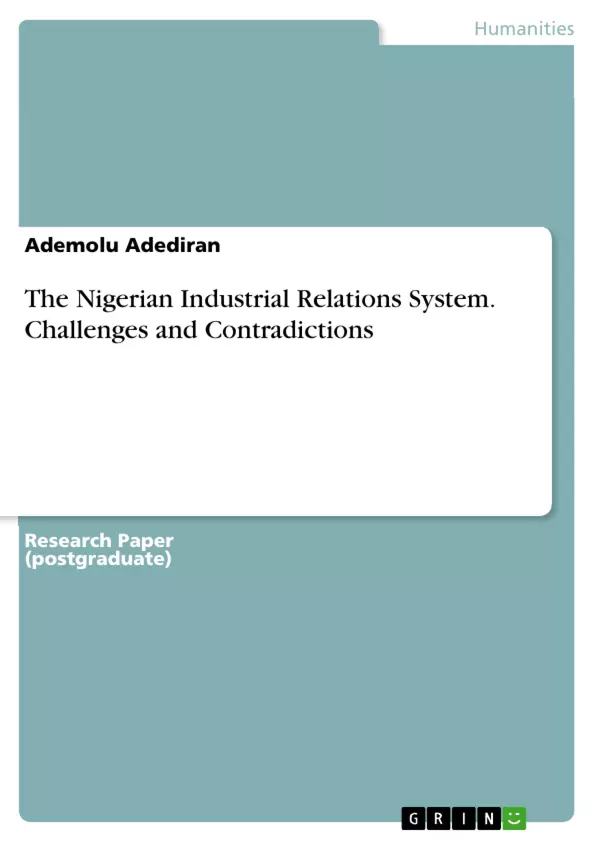The paper through critical analysis of available literature, and analysis of data from secondary sources such as official publications, journals, and conference papers aims to examine the Nigerian industrial relations system for its contending issues and challenges.
The complex employment interrelationship between the Nigerian government, labour unions, organizations’ management, and employers' associations has been a rocky one. The goal of the interrelations which is to facilitate economic growth and assist all parties to achieve their objectives is menaced by incessant conflicts and a high level of strike propensity.
It was found that certain contradicting issues and challenges are apparent in the regulatory framework and administering bodies thus leading to ineffectiveness and inefficiency. Challenges such as insincerity of involved parties, tailoring of the system towards western models, and other political and economic factors are also inhibiting the system.
Table of Contents
- 1.0 Introduction
- 2.0 Conceptual and Theoretical Framework
- 2.1 Conceptual framework
- 2.2 Theoretical framework
Objectives and Key Themes
This paper aims to examine the Nigerian industrial relations system, identifying and discussing its challenges and contradictions. It analyzes the regulatory framework, administering authorities, and labor unions, focusing on the conflicts and issues hindering effective industrial relations.
- Challenges within the Nigerian industrial relations regulatory framework.
- The conflicting interests of the government, labor unions, and employers.
- The impact of Western models on the Nigerian industrial relations system.
- The role of political and economic factors in shaping industrial relations.
- Potential solutions and recommendations for improving the system.
Chapter Summaries
1.0 Introduction: This introductory chapter sets the stage by highlighting the turbulent relationship between the Nigerian government and labor, characterized by frequent conflicts and strikes. It emphasizes the significant economic losses resulting from these disputes and introduces the paper's objective: to analyze the challenges and contradictions within the Nigerian industrial relations system, examining its regulatory framework, administering bodies, and labor unions.
2.0 Conceptual and Theoretical Framework: This chapter provides the conceptual and theoretical underpinnings of the study. The conceptual framework defines key terms such as "labor," "industrial relations," "labor laws," and the roles of the government, labor unions, and employers' associations within the system. It outlines the sources of Nigerian labor law, including received English law, Nigerian legislation, judicial precedents, international treaties, and collective agreements. The theoretical framework draws upon conflict theory, viewing the inherent conflicts between employers and workers as stemming from their opposing interests. It further examines the role of the state within this conflict, positioning it often as an instrument of the ruling class, potentially suppressing worker interests.
Nigerian Industrial Relations System: Frequently Asked Questions
What is the overall purpose of this document?
This document provides a comprehensive preview of a paper analyzing the Nigerian industrial relations system. It includes the table of contents, objectives and key themes, and chapter summaries, offering a structured overview of the paper's content and key arguments.
What topics are covered in the document's Table of Contents?
The table of contents currently shows an introduction and a chapter on the conceptual and theoretical framework. The theoretical framework section is further divided into conceptual and theoretical components.
What are the key objectives and themes explored in the paper?
The paper aims to examine the Nigerian industrial relations system, identifying and discussing its challenges and contradictions. It focuses on the regulatory framework, administering authorities, and labor unions, analyzing conflicts and issues hindering effective industrial relations. Key themes include challenges within the regulatory framework, conflicting interests between stakeholders (government, unions, employers), the impact of Western models, the role of political and economic factors, and potential solutions for improvement.
What is discussed in the Chapter 1 summary (Introduction)?
The introduction highlights the turbulent relationship between the Nigerian government and labor, characterized by frequent conflicts and strikes and their significant economic consequences. It establishes the paper's objective: to analyze challenges and contradictions within the Nigerian industrial relations system.
What is covered in the Chapter 2 summary (Conceptual and Theoretical Framework)?
Chapter 2 defines key terms like "labor," "industrial relations," and "labor laws," outlining the roles of government, unions, and employers. It details the sources of Nigerian labor law (English law, Nigerian legislation, judicial precedents, international treaties, and collective agreements). The theoretical framework uses conflict theory, focusing on the inherent conflicts between employers and workers and the state's role within these conflicts.
What theoretical perspective is used in the paper?
The paper utilizes conflict theory to analyze the inherent conflicts between employers and workers, viewing these conflicts as stemming from opposing interests. It also examines the state's role within this conflict, often positioning it as potentially suppressing worker interests.
What are the sources of Nigerian labor law, according to the document?
The sources of Nigerian labor law, as outlined, include received English law, Nigerian legislation, judicial precedents, international treaties, and collective agreements.
- Quote paper
- Ademolu Adediran (Author), 2021, The Nigerian Industrial Relations System. Challenges and Contradictions, Munich, GRIN Verlag, https://www.grin.com/document/1130835



